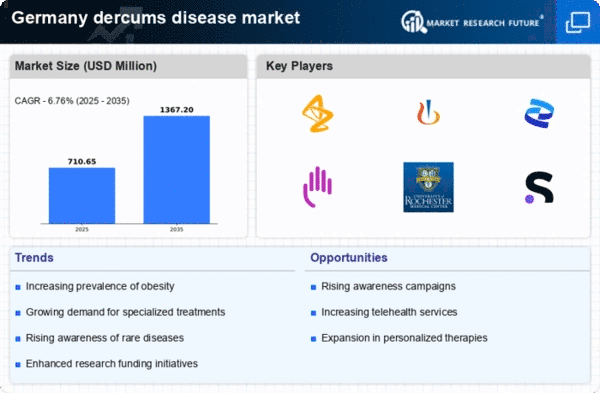Increasing Prevalence of Dercums Disease
The rising incidence of Dercums disease in Germany is a crucial driver for the market. Recent studies indicate that the prevalence of this rare condition is gradually increasing, with estimates suggesting that approximately 1 in 100,000 individuals may be affected. This growing patient population necessitates enhanced healthcare services and treatment options, thereby expanding the dercums disease market. As awareness increases among healthcare professionals and the general public, more individuals are likely to seek diagnosis and treatment, further propelling market growth. The healthcare system in Germany is adapting to these changes, with a focus on specialized clinics and research initiatives aimed at understanding the disease better. Consequently, the increasing prevalence of Dercums disease is expected to significantly impact the dercums disease market in the coming years.
Emergence of Specialized Treatment Centers
The establishment of specialized treatment centers for Dercums disease in Germany is a significant market driver. These centers are designed to provide comprehensive care tailored to the unique needs of patients suffering from this condition. With a focus on multidisciplinary approaches, these facilities offer a range of services, including pain management, psychological support, and nutritional counseling. The presence of such centers enhances patient access to expert care, which is crucial for effective disease management. As more centers emerge, the dercums disease market is likely to experience growth due to increased patient referrals and improved treatment outcomes. Additionally, these centers often engage in clinical research, contributing to the body of knowledge surrounding Dercums disease and fostering innovation in treatment methodologies.
Government Funding for Rare Disease Research
Government initiatives in Germany aimed at funding research for rare diseases, including Dercums disease, are pivotal for market expansion. The German government has allocated substantial resources to support research and development in the field of rare diseases, with funding reaching approximately €100 million annually. This financial backing encourages pharmaceutical companies and research institutions to invest in innovative treatment options and clinical trials. As a result, the dercums disease market is likely to benefit from advancements in therapies and improved patient outcomes. Furthermore, increased collaboration between public and private sectors is fostering a conducive environment for breakthroughs in understanding and treating Dercums disease. This government support not only enhances the visibility of the condition but also stimulates interest among investors and stakeholders, thereby driving the overall market.
Technological Advancements in Diagnostic Tools
Technological advancements in diagnostic tools are transforming the landscape of the dercums disease market in Germany. Innovations such as advanced imaging techniques and genetic testing are enabling more accurate and timely diagnoses of Dercums disease. These developments are crucial, as early diagnosis can significantly improve patient outcomes and treatment efficacy. The integration of technology in healthcare is also facilitating better data collection and analysis, which can lead to enhanced understanding of the disease's etiology and progression. As diagnostic capabilities improve, healthcare providers are likely to see an increase in patient referrals, thereby expanding the dercums disease market. Moreover, the ongoing research into biomarkers and other diagnostic indicators holds promise for future advancements, potentially leading to more personalized treatment approaches.
Rising Demand for Patient Advocacy and Support Groups
The growing demand for patient advocacy and support groups in Germany is influencing the dercums disease market positively. These organizations play a vital role in raising awareness, providing resources, and offering emotional support to patients and their families. As more individuals become aware of Dercums disease, the need for community support becomes increasingly apparent. Advocacy groups are instrumental in lobbying for better healthcare policies and funding for research, which can lead to improved treatment options. The presence of these groups not only empowers patients but also drives engagement with healthcare providers, thereby enhancing the overall market landscape. Furthermore, the collaboration between advocacy groups and medical professionals is likely to foster a more informed patient population, which could lead to earlier diagnosis and intervention.
















